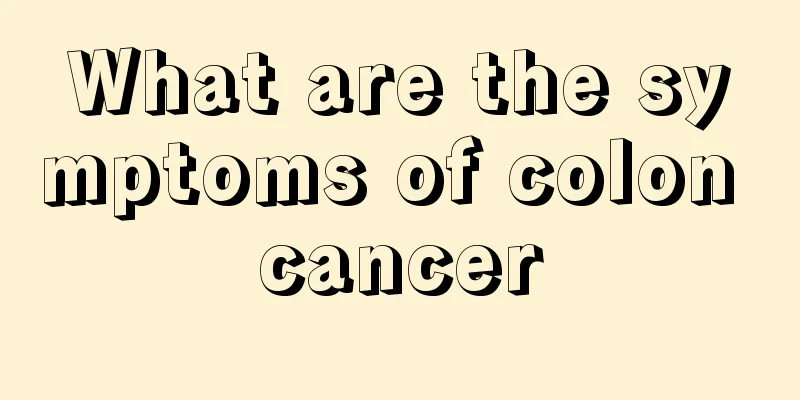What are the symptoms of colon cancer

|
Intestinal cancer is a malignant tumor with a high incidence in recent years. The main patients are middle-aged and elderly people, and there is a trend of younger people. The incidence of intestinal cancer is related to unreasonable eating habits, chronic enteritis, environmental factors and genetic factors. If it is discovered early, it can effectively prolong the patient's life. So, what are the symptoms of intestinal cancer patients? The main symptoms of colorectal cancer patients are: 1. Blood in the stool. In the early stages of colorectal cancer, patients may have blood in the stool. When blood in the stool occurs, patients generally do not feel pain, and the blood is bright red, so it is often mistaken for hemorrhoids and neglected for examination and treatment. In the late stages of colorectal cancer, the blood in the stool will be dark red and accompanied by mucus or pus and blood. 2. Changes in bowel habits After suffering from colorectal cancer, the rectal tumor produces irritating secretions, and the patient will feel tenesmus and incomplete defecation when defecating, and the frequency of defecation will also increase. The stool changes from normal yellow strips to very thin strips with mucus, pus and blood attached. 3. Systemic symptoms. Intestinal cancer can cause tumors to surround the intestinal wall, narrowing the intestinal cavity and causing intestinal obstruction. When intestinal cancer reaches the late stage, patients will experience a series of systemic symptoms, such as anemia, weight loss, general weakness, loss of appetite, etc. 4. Lesions in other organs. When colorectal cancer develops to the late stage, the organs around the rectum and colon will also be affected and lesions will occur. When bladder and prostate tissues are lesioned, patients may feel urgent, frequent and difficult urination. Some patients may even have their livers affected, causing adverse symptoms such as ascites, liver enlargement, jaundice, etc. The above are the main symptoms of colorectal cancer. After suffering from colorectal cancer, it is very important to adjust your diet. Patients must avoid eating foods that are too high in fat and cholesterol, such as animal oils, animal offal, etc., and eat more fresh fruits. The patient's food should not be too refined, and eating more crude fiber foods is also helpful for recovery. In addition, you should actively cooperate with the doctor's treatment and build confidence in fighting the disease. |
<<: How effective are the analgesics for colorectal cancer
>>: Is chemotherapy useful for advanced colorectal cancer?
Recommend
What is the reason for repeated acne on the right cheek?
The causes of acne on the face include getting an...
The best Chinese medicine hospital for treating liver cancer
There are few reports on liver cancer with hyperf...
How to do splits for beginners
People who learn to dance know that splits are a ...
There are several ways to prevent fibroids
Although fibroma is not very serious, I believe n...
What does a positive urine test for drug use mean
For drug addicts, your body resistance is relativ...
The most effective exercise to slim down your legs
Thin legs is the dream of many women. It can help...
What are the correct ways to wear colored contact lenses
In life, many people wear colored contact lenses,...
I kept smoking from the time I was pregnant until I was about to give birth
When a woman is pregnant, she should consider the...
What are the benefits of sauna
I believe everyone is familiar with sauna. With a...
Beer is the best way to prevent mosquitoes
The beer we usually drink has a certain mosquito ...
Is blood in sputum from lung nodules lung cancer?
Is blood in sputum from lung nodules lung cancer?...
What is the alcohol content for fire therapy
Nowadays, medical technology is advancing rapidly...
The efficacy and function of Begonia papaya
In our lives, many people like to eat crabapples....
What are the folk remedies for treating uremia?
The cause of uremia is generally related to the k...
Are there any side effects of abdominal breathing during exercise?
In normal times, many people love to do sports, b...









